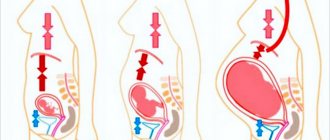Almost every pregnant woman has experienced heartburn at least once. There are many reasons for this. During pregnancy, a woman’s body experiences enormous stress, hormonal levels change, which cannot but affect digestion. Although heartburn is not considered a pathology during pregnancy, this does not mean that you have to endure burning and discomfort. Your doctor may recommend various remedies for heartburn during pregnancy.
What does Omez consist of and how does it work in the body?
The medicine belongs to the group of so-called proton pump inhibitors - drugs that inhibit the production of hydrochloric acid in the stomach. Acid is secreted by glands located on the inner wall of the organ, and the proton pump is an enzyme on the surface of the glands that affects the acidity of gastric juice. Once in the body, Omez:
- reduces the amount of enzyme;
- stimulates the synthesis of bicarbonates - substances that neutralize excess acid.
The normal environment in the stomach is restored, digestion is improved and erosive ulcers heal. First of all, Omez is used to treat:
- peptic ulcers of the stomach and duodenum;
- gastritis caused by taking non-steroidal anti-inflammatory drugs;
- reflux esophagitis - a pathology in which the contents of the stomach are thrown into the esophagus due to weakness of the sphincter; accompanied by debilitating heartburn and belching.
Heartburn is a sign of a pathology called reflux esophagitis, which affects the esophageal mucosa
The active substance of the drug is omeprazole. Once in the stomach, omeprazole has a therapeutic effect within the first hour, less often - after two hours; the action lasts for a day. If taken regularly, the maximum effect occurs after four days; after cessation of therapy, Omez acts in the body for another three or four days.
The processed residues of the substance leave the body in the urine.
Types and dosage forms of the drug
On packages in pharmacies you can see the following names: Omez D, Omez DSR, Omez Insta; Varieties of the drug differ in both composition and effect in the body.
Table: Omez and its types
| Name | Composition, release forms | How does it work |
| Omez | Omeprazole and auxiliary components. Sold in the form of enteric capsules, as well as lyophilisate, from which a solution for intravenous infusion is made; gelatin capsules in a transparent case with white or yellowish granules inside contain 10, 20 and 40 mg of omeprazole; added:
The lyophilisate (in the form of a porous cake) in addition to the main component includes sodium hydroxide and disodium edetate. | Reduces the level of hydrochloric acid in the stomach, fights ulcers, gastritis, and severe heartburn. When an ulcer worsens, Omez is administered intravenously using a dropper - then the drug acts faster and more effectively. |
| Omez D | The two active ingredients are omeprazole and domperidone. Found in gelatin capsules filled with white powder. | Domperidone helps speed up gastric emptying by synchronizing peristalsis and also has an antiemetic effect. Omez D is effective for reflux esophagitis, which simple Omez cannot always cope with. |
| Omez DSR | Contains domperidone and omeprazole, and domperidone is present in the form of delayed release granules. Available in gelatin capsules | The slow release of domperidone prolongs the effect of the substance in the body. |
| Omez Insta | Main component, plus additional:
Sold in powder form, from which a suspension is prepared for oral administration. | The suspension, like other forms of Omez, rids the stomach of excess hydrochloric acid, but acts more gently, which is why this drug is prescribed even to children over two years of age. A single use of Omez Insta will quickly and safely relieve heartburn. |
Omez capsules are packaged in blisters and packed in cardboard boxes
Omez and pregnancy
Omeprazole is not prohibited for expectant mothers, but only if the woman’s health is at risk and the likely benefit of the medicine outweighs the potential danger to the baby in the womb.
Comprehensive information on the effect of the drug on fetal development has not been collected, which is why a number of doctors are skeptical about treating pregnant women with Omez.
The FDA Office of the US Department of Health, which classified drugs according to the level of safety for the unborn child, classifies omeprazole in category C (the third of five): animal experiments revealed defects in babies, and clinical trials on pregnant women were not conducted.
However, foreign doctors are collecting statistics, and the facts suggest that Omez is not as dangerous as previously thought; English and Italian scientists have calculated that the threat to embryonic development when taking the drug is no more than 0.9 percent. Other observations of pregnant women taking Omez also did not find an increase in the number of birth defects in the fetus. And, as a rule, there are no serious consequences for the health of women themselves.
But all this applies to omeprazole in its pure form; As soon as domperidone is added to the drug, the picture changes. Omeprazole combined with domperidone is clearly dangerous for expectant mothers; taking such drugs during pregnancy is contraindicated. This means that medications such as Omez D and Omez DSR are not intended for pregnant women.
Since omeprazole overcomes the placental protection and reaches the fetus, you should not make the task easier for the substance and pour the solution with the drug directly into the blood using a dropper. The concentration of omeprazole in the bloodstream will be higher, which means that the baby will receive an impressive dose of the medicine. So you will also have to abandon Omez lyophilisate.
We come to the conclusion: if the expectant mother has to deal with the drug, it is better to choose capsules or suspension.
A suspension with mint flavor is prepared from Omez Insta powder, which acts more gently in the body than other dosage forms of the drug.
Omez at different times
In the 1st trimester, the baby’s body is just forming in the womb, this mechanism is complex and fragile, and a drug “invasion” can disrupt it. In addition, the mother’s body still lacks the main protector of the fetus - a temporary organ, the placenta, through which it is problematic for medicinal substances to penetrate. And since there is no placenta, access to the unborn child is open. Therefore, in the early stages, pregnant women are advised, if possible, to do without Omez, a drug that is classified as a potentially dangerous drug.
In the 2nd trimester, the risks from taking medications decrease; the fetus is protected by the placenta, and although some of the medicinal substances still leak through it, the baby is safer than before. Omez is carefully prescribed when the pathology cannot be dealt with without the drug.
In the last three months before childbirth, competent doctors prefer to use medications whose safety has been clinically proven. After the 36th week, as a rule, stop using any medications so as not to complicate the upcoming birth. It is highly undesirable to take Omez in the 3rd trimester.
Folk remedies for heartburn
Gaviscon for heartburn
When a pregnant woman first experiences heartburn, she tries to avoid the use of various medications and get rid of this condition with folk remedies. However, it is worth remembering that not all traditional medicines are safe during this period.
Some can cause severe allergies or cause other problems besides heartburn. Therefore, it is still advisable to consult a doctor before treatment. Some folk remedies:
- Most often, doctors first recommend adjusting your diet. If the problem is in nutrition, then after reducing the consumption of fatty foods and chocolate, heartburn will go away on its own.
- Baking soda is a very popular folk recipe for heartburn. However, you shouldn't get carried away with it. Soda is not harmless to the stomach; it irritates the walls, after which the attack of heartburn recurs after a while. Baking soda is not a completely safe natural remedy. When taken regularly, it retains fluid and causes swelling, and can also cause an allergic reaction. You can drink soda (it is recommended to add it to water or milk) only if the attack of heartburn is unbearable and there are no other medications at hand.
- Mineral water is great for heartburn. Pregnant women should only choose slightly alkaline water and release gas before drinking. It should be remembered that medicinal mineral water cannot be drunk constantly and in any quantity. You also need to read the label and read all side effects and contraindications.
- Sometimes a sip of milk is enough to get rid of heartburn. Milk has enveloping properties and reduces acidity. This is not always effective, but it is worth trying this safe method first.
- Nuts. Regular consumption of nuts reduces the likelihood of heartburn. Unfortunately, this method does not quickly eliminate existing heartburn.
- Don't lie down after eating. Immediately after eating, you should not take a horizontal position so that acid does not enter the esophagus. If you need to lie down, you should raise the pillow higher so that the position is reclining. Sometimes following this simple rule and a simple diet is enough.
When and how to use Omez for an expectant mother
According to statistics, nine out of ten pregnant women become acquainted with toxicosis in the early stages; I feel nauseous in the morning, vomiting is possible, and debilitating heartburn. Inexperienced girls can take all this for signs of gastritis and prescribe Omez on their own (well, my friend drank it, she praises it). The decision is incorrect: with toxicosis, the pregnant woman’s body is basically healthy, no treatment is required, especially with such strong drugs as proton pump inhibitors.
Nausea and vomiting are signs of gastritis, but also toxicosis; it is important not to confuse one with the other and not to start treatment with Omez before making a diagnosis
It’s a different matter when the expectant mother, even before pregnancy, often visited a gastroenterologist, suffering from one or another disease of the digestive system. Alas, bearing a fetus does not alleviate chronic pain; on the contrary, it aggravates it. And the deterioration of a woman’s health negatively affects the development of the unborn child, so treatment cannot be avoided. Only therapy needs to be adjusted to new circumstances so as not to harm the baby with medications.
The doctor may choose to use Omez cautiously when the expectant mother, after diagnosis, is diagnosed with:
- stomach ulcers - including those caused by infection of the organ with Helicobacter pylori bacteria;
- duodenal ulcer;
- chronic gastritis;
- gastroduodenitis (inflammation of the mucous membranes of the duodenum and the adjacent part of the stomach);
- reflux esophagitis, leading to inflammation of the esophagus.
To catch the disease in time, consult a doctor if you find:
- even after a light meal, heaviness in the stomach - as they say, a “stone” stomach;
- sharp stomach pain when feeling hungry;
Acute abdominal pain on an empty stomach is a sign of gastritis; the discomfort temporarily goes away when the woman eats - frequent attacks of heartburn;
- increased salivation;
- bowel dysfunction, which is accompanied by constipation.
If heartburn, nausea and vomiting appear in the later stages, gestosis, a serious illness that occurs exclusively in pregnant women, cannot be ruled out; but it is not treated with Omez.
And in case of an ulcer or reflux with gastritis, a competent doctor will most likely find a safer remedy for a pregnant patient than Omez.
Dosage and course
Having decided to treat the expectant mother with Omez, the doctor is responsible for calculating the dose of the drug and the duration of therapy. Thus, the daily dose of omeprazole for adults is 40 mg, divided into two doses; The ulcer is treated with Omez for three to eight weeks. However, for a patient in position, an individual dosage is required, which is usually lower than usual, as well as a shorter course of administration.
Capsules are taken orally with water before meals. You cannot chew the pills - omeprazole should only be released once it enters the stomach, where it begins to work to neutralize the production of hydrochloric acid.
If severe stomach pathologies are caused by the bacterium Helicobacter pylori living in the organ, the woman is prescribed antibiotics along with Omez.
To prepare Omez Insta suspension:
- Open the bag of powder (each bag contains 20 mg of omeprazole).
- Pour the powder into a glass or cup, add 2 tbsp. l. water (not juice, milk or any other liquid).
- Stir until smooth and drink immediately.
- If desired, you may take the suspension with one or two sips of water.
The dosage of Omez Insta is also determined by the doctor.
Who should not be treated with Omez
The list of contraindications for the medicine is short; So, those expectant mothers who have:
- allergy to omeprazole or other components of the drug;
- lactase deficiency (only for capsules containing lactose);
- deficiency of sucrase, an enzyme that helps digest sucrose.
If a woman is HIV-infected and takes drugs - Nelfinavir or Atazanavir - Omez therapy will also have to be abandoned, since omeprazole sharply reduces the effectiveness of these antiviral drugs.
It is dangerous to prescribe the medicine to women with impaired liver and kidney function, suffering from intestinal obstruction or internal bleeding.
The instructions say that therapy with Omez can mask the symptoms of cancer, so before prescribing the drug, the doctor should make sure that the patient does not develop a malignant tumor.
Adverse reactions
More often than others, patients taking Omez experience allergy symptoms - itching, urticaria; in exceptional situations it can lead to bronchospasm and even anaphylactic shock.
Skin rashes like after a nettle burn are one of the negative consequences of taking Omez if a woman is allergic to omeprazole
Other negative consequences of taking the medication rarely bother women; sometimes occur:
- stomach ache;
- diarrhea or vice versa - constipation;
- dry mouth;
- vomit;
- joint pain;
- headache;
- nervous excitement;
- depression;
- blurred vision;
- increased sweating;
- swelling of the limbs;
- decreased levels of white blood cells or platelets in the blood.
Treatment with omeprazole leads to a decrease in the acidity of gastric juice, which means that it is possible to increase the activity of pathogenic bacteria such as salmonella, which provoke intestinal infections. True, the risk of infection is negligible.
How Omez interacts with other medicines
Omeprazole reduces the effect of a number of antifungal drugs - for example, Ketoconazole, Posaconazole. If you suffer from iron deficiency anemia, please note that Omez impairs the absorption of iron supplements in the body, so it is better not to combine them. Also, a decrease in stomach acidity prevents cyanocobalamin (vitamin B12) from being absorbed into the blood.
Details of interaction with other medications:
- in combination with Warfarin, a medicine that slows down blood clotting, omeprazole leads to an increase in the concentration of the anticoagulant, which threatens excessive blood thinning; but such consequences are possible only when the daily dose of Omez exceeds 20 mg;
- enhances Omez and the effect of Diazepam, an anticonvulsant with a sedative effect, which is occasionally cautiously prescribed to pregnant women; simultaneous use of these medications is undesirable;
- but when used together with the antibiotic Erythromycin, the level of omeprazole in the blood already increases - and the substance is already recognized as potentially unsafe for the fetus;
- if the expectant mother taking Omez is in addition treated with drugs containing a medicinal herb called St. John's wort, the level of omeprazole in the blood plasma will decrease.
Treatment and non-treatment during pregnancy
Pregnancy is a special state of the body when all systems are reconfigured in a protective manner: you need to protect the fetus. But pregnant women also get sick, both from common colds and from something more serious. Well, and, of course, toxicosis, which spoils part of the happy period for almost all expectant mothers. Everyone around, and sometimes doctors, perceive a pregnant woman as the Holy Grail, into which it is better not to send any pills again, but often the lack of proper treatment is more harmful than the policy of “wait it out, it will go away on its own.” Even more dangerous is self-medication, especially with herbs - for some reason people often underestimate their potential harm. Let's figure out what medications pregnant women can and cannot take. Toxicosis The most common complaints are nausea, vomiting and heartburn. All “matryoshkas” can take acid-lowering drugs, and the best of them are proton pump inhibitors: pantoprazole (Nolpaza, Controloc) is the most reliable, esomeprazole (Emanera, Nexium) is the strongest, rabeprazole (Razo) can be taken regardless of food intake. But the old and well-known omeprazole (Omez), although approved, has a number of disadvantages, including insensitivity to it in 13% of people, an unknown elimination rate (and the required frequency of administration, respectively) and side effects with long-term use.
Gaviscon is added to “-prazoles” upon request - it envelops the esophagus, relieves heartburn and creates a protective “raft” on the surface of food (taken after meals) that does not allow acid to rise up. Maalox, Phosphalugel and Almagel are less preferable because contain magnesium or aluminum, and they affect the stool: magnesium softens, aluminum strengthens.
Bismuth preparations (De-nol, Ulcavis) are prohibited. For persistent nausea, Itopride (Ganaton, Itomed) is taken before meals, but Domperidone (Motilium, Motilak) is less preferable, because may cause arrhythmia.
Stagnation of bile Against the background of increased levels of sex hormones, bile thickens, and gallstones may even form. If there is heaviness in the right side or a bitter taste, then the doctor, based on the results of the examination (ultrasound of the obstructive system, blood biochemistry), will select a choleretic agent (Ursosan or its brothers, Hofitol) or an antispasmodic (mebeverine) for spasms of the biliary tract. It must be said that for any cramps or abdominal pain, pregnant women can take mebeverine (Duspatalin, Sparex), and, unlike no-shpa (which, in principle, is also possible), it is allowed to drink it for as long as desired.
They write different things about Ursosan during pregnancy on the Internet; in fact, the drug has been used for a long time, and the benefits of it for cholestasis (stagnation of bile) are much greater than the fears of it. Heptral is used during pregnancy, and although its effectiveness has recently been questioned by some researchers, it has been successfully used for damage to liver cells. However, its appointment is always within the competence of the attending physician only. Other drugs that present themselves as hepatoprotectors are NOT such. Karsil, Legalon, Silymarin, Gepabene, Liv52 and other milk thistle are ways for pharmaceutical companies to make money. And the advertised Essentiale and Phosphogliv can also cause harm, giving a phospholipid load to the already suffering liver (they are not prescribed for normal liver tests, but for elevated ones they are not prescribed, as you can read about even in the instructions).
Toilet issue As pregnancy progresses, the intestines move away and are pressed by the uterus, plus progesterone slows down intestinal peristalsis, which causes constipation. They can be treated for a long time with lactulose (Duphalac), bran (Eubicor), PEG (Forlax) or, on demand, Bisacodyl or Fitolax. At the end of gestation (and for some even earlier), diarrhea appears; this is a consequence of the influence of interleukins, substances that prepare the cervix for dilatation. If you need to “go out into the world” where there is no restroom nearby, loperamide (Immodium) or Smecta is used on demand. For diarrhea due to poisoning, Enterosgel or Polysorb are used. Of course, it is not recommended to buy Kolofort and other homeopathic medicines, because homeopathy does not work and cannot work.
We live in a world of evidence-based medicine, as the World Health Organization and the Russian Ministry of Health taught us all, so don’t waste money on “bullshit”, rather have a wonderful weekend, it will even be more effective as a placebo. And more pleasant.
Drugs like Hilak Forte have proven ineffectiveness and additionally increase the acidity of gastric juice, and there is a lot of controversy about probiotics. In fact, everything is clear: Bifiform, Probiologist, Buck Set and some of their brothers are able to suppress a mild intestinal infection without being absorbed as “their” new flora (they come like riot police, which is why all the “swindlers” scatter, giving them the opportunity to grow on their own native lacto- and bifido-intestinal protectors). A similar mechanism occurs when using antibiotics - both “enemies” and “friends” die, which is why the opportunistic flora multiplies to alarming limits, but lacto-bifido is always stronger and will always suppress the uprising of dubious bacteria.
Enzymes It is worth talking separately about pancreatic enzymes. Pancreatins are not needed by everyone and not always; They are prescribed by a doctor based on the results of stool tests (coprogram, elastase), if the pancreas cannot cope with the entire volume of work. This allows food to be better absorbed, which is especially important during pregnancy, when a lack of nutrients can threaten the mother with problems with teeth and more. By the third trimester, the load on the pancreas increases threefold, which can also manifest as gestational diabetes mellitus (the pancreas secretes both enzymes and insulin).
That is why expectant mothers are sent to check their glucose levels with enviable regularity. It is easy to suspect a lack of enzymes: bloating, pieces of undigested food in the stool and, most importantly, stool that is difficult to flush, sticky due to the content of undigested fats.
Food, as we know, is the best medicine, and expectant mothers need to think about what they eat. The main principle is everything, but in moderation. The child will most likely never develop an allergy to the foods that the mother ate while pregnant, which is why the food should be varied. And delicious.
Herbal medicine As already mentioned, herbal medicine is not as safe as we would like. For example, chamomile and echinacea in the first trimester can greatly harm the course of pregnancy and even terminate it.
In a tablet, all the substances have been studied inside and out, but in herbs there are hundreds of active ingredients in unknown concentrations, and how they will all interact with your body is unknown, and therefore dangerous. Herbs are often prescribed for kidney disease or cystitis in the form of drugs Cyston, Urolesan, Canephron. There have been no serious studies on the drugs, but Cyston definitely cannot be taken during pregnancy, Urolesan is not prohibited, and whether Canephron is effective is a big question. But mineral waters (acidic or alkaline, depending on the type of kidney disease) are reliably curative.
Here I would like to mention vitamins. The story with them is different: they are drunk by all groups of the population, although in reality they are needed only by pregnant and lactating women. To make the right choice, carefully study the composition. Alphabet, Elevit, Vitrum quite well fill the increased needs for “utilities”.
Colds In addition to digestive problems, pregnant women, like all people, face colds. Respiratory infections can be viral or bacterial, which determines how they are treated. To get rid of bacteria, antibiotics are prescribed, which expectant mothers usually fear like fire. And in vain, because the potential harm to the baby due to infection in the mother’s body can be much higher. In addition, such medications are prescribed only for severe infections (tonsillitis, pyelonephritis), and a number of antibacterial drugs have shown sufficient safety during pregnancy.
These are amoxicillin, cefazolin, cefatoxime and azithromycin. The sensitivity to other approved antibiotics (ampicillin, erythromycin) in the microorganisms around us is lower, so they are prescribed less often. Antibiotic sprays cannot create an adequate bactericidal dose and have not been recommended since 2013; only tablets are used.
Local remedies for bacterial infections in the throat include Lyzobact (contains lysozyme, a natural salivary antiseptic) and Sinupret (herbs), although their effectiveness has not been proven in large studies. But what has been definitely proven is the absolute absence of anti-ARVI viral drugs and immunomodulators. Interferons are not able to be absorbed from mucous membranes; they are used only for hepatitis C and only in the form of injections. The list of “Fuflomycins” is huge, because everyone who has the flu wants to believe in a “cure pill”, and pharmaceutical companies make their billions from this.
Drugs that are reliably not working include: Antigrippin, Amiksin, Anaferon, Arbidol, Aflubin, Viferon Imudon, Immunal, Ingavirin, Irs19, Cytoflavin, Polyoxidonium... Separately, it is worth mentioning Tamiflu. For a long time, doctors from different countries, including Russia, England, and France, were honestly mistaken about it, but after the patent expired it turned out that the studies were fabricated, and its effectiveness is not comparable with its price. To facilitate the discharge of sputum, there are also fictitious drugs that you should not take: Gelomirtol, Gedelix, Pertussin. They work and are allowed for pregnant women, however, only in the 2-3 trimesters Bromhexine, Ascoril, ACC and Fluifort.
It is better to try not to catch a cold and activate the body’s natural defenses using natural methods: walks in the fresh air, a balanced diet and long sleep.
Matters of the heart Both from anxiety in anticipation of a new life, and from an increase in body weight and the number of blood vessels during pregnancy, the load on the heart increases, and sometimes blood pressure changes. Usually, if a woman is healthy, her blood pressure decreases because the pregnancy hormone progesterone turns on a protective “sleepy” mode. But if there were prerequisites (kidney disease, atherosclerosis), as well as under stress, blood pressure and pulse may increase. There are hypertension that existed before pregnancy and gestational hypertension that arose in connection with pregnancy. Regardless of how long ago it is, high blood pressure needs to be corrected, and here is an important point: almost all of the most prescribed heart medications and blood pressure pills are strictly prohibited.
Among them are everyone’s favorite Enap, Prestarium, Lozap, Valz, Hypothiazide, Furosemide. In the second and third trimesters, if you are careful, you can use Physiotens and Amlodipine; there are discussions regarding Concor. To quickly reduce elevated blood pressure, you need to take nifedipine orally, for pain in the heart - nitroglycerin, and then call an ambulance: blood pressure and the heart are not to be trifled with, and self-medicating in such a situation can be dangerous for both lives.
As always, and here there are many drugs that do not work, “fuflomycins” have not been spared in the cardiovascular field. What no one, especially pregnant women, should have at home: Validol, Corvalol, Valocordin, Cavinton, Mildronate, Mexidol, Cerebrolysin, Preductal, Actovegin, Solcoseryl, Gliatilin, Glycine, Pantogam, Octolipen, Piracetam, Phenotropil. Many note the subjective effect of Mexidol, Octolipen and Mildronate, but this is personal experience, not a proven effect. Forget about them.
Of the vascular products used to treat varicose veins, which always worsen during pregnancy due to weight bearing on the legs, only Detralex works well, which is not contraindicated for expectant mothers.
For nerves The birth of a child radically changes a woman’s life: there will be less time for usual hobbies, but the joys of communicating with the baby will appear. And, of course, fears may arise: “Will I be a good mother? Which school should I choose? What if he becomes a football player?..” It `s naturally. Although sometimes experiences that are not necessarily related to the baby can be very disturbing.
Among the sedatives often prescribed to expectant mothers are Novopassit, Phenibut, Afobazol, Tenoten. In general, it is possible to take them, but it is pointless: if they work, it is as a placebo. The decision to prescribe serious medications is made by the doctor in each case individually. To date, it has been proven that taking antidepressants during pregnancy does not cause a risk of heart defects in the fetus, does not reduce the IQ of the child, and does not increase the mortality of either the fetus or the child. Don't be afraid, but don't do anything on your own. But what every expectant mother can do herself is to take care of her peace of mind, walk, enjoying the beautiful scenery, listen to her favorite music, create and read good books.
Bruises Changes occur in the coordination of movements as the abdomen enlarges, and maintaining balance is no longer so easy, so not everyone can avoid bruises and sprains. Locally, in such situations, it is absolutely possible to apply creams and gels with NSAIDs (painkillers-anti-inflammatory), Diclofenac and Airtal penetrate the skin best. But chondroitins like these - Piaskledin, Structum, Teraflex, Alfutop - you guessed it, nonsense. A special nod to Traumeel, who not only doesn’t work, but relates to homeopathy in general. Group B drugs in certain concentrations and ratios (Milgamma or Combilipen) can provide pain relief no worse than diclofenac; this is a proven fact without a described mechanism of action, i.e. we don't know how, but it works.
If the pain is severe, enduring it may be more harmful than taking a pill. The safest choice is Nurofen. And No-spa, if the pain is due to muscle tension, spasms (any pain in the abdomen) or due to high blood pressure.
Pregnancy is the best time in a woman’s life; it is the peak of hormone levels, thanks to which she can perceive the world even more deeply, see colors more vividly, and perceive harmony in everything. Pregnancy is an inspiring flight of inspiration! So let it be easy and pleasant for all continuers of the family, and let the doctor help with the little things.
Enjoy motherhood and be healthy!
How can you replace Omez during pregnancy?
Among proton pump inhibitors, there are complete analogues of Omez (Losec), as well as drugs with a different composition but similar effects in the body.
To reduce stomach acidity, antacids are also used - Almagel, Maalox; Such drugs have fewer side effects and are better tolerated by patients.
Omez is produced in India, the price of the drug is quite affordable - a pack of 10 capsules in the capital's pharmacies costs from 77 rubles. Some substitutes are sold at much higher prices.
Table: Omez analogues allowed for expectant mothers
| Name | Composition, release form | How it works in the body | Contraindications, use during pregnancy | Cost in Moscow |
| Losek MAPS (Sweden) | Synonymous with Omez, it contains the same main substance - omeprazole; among the additional ones:
Available in tablets. | Antiulcer drug, a qualitative predecessor of Omez; Omez itself is a generic version of Losek. Works similarly; Already when taking 20 mg of the drug per day, the acidity of gastric juice decreases by 80 percent. | Intolerance to substances in Losec. It is not prohibited for pregnant women, but the instructions recommend taking the pills only after the doctor’s approval and in situations where the disease threatens the woman’s life. | 619 rubles (pack of 28 tablets). |
| Nexium (Sweden) | The active ingredient is esomeprazole magnesium; added:
Coated tablets. | Treats the same diseases as Omez; Nexium reduces acidity in the stomach by 90 percent in 5 days of therapy (20 mg per day); in 9 out of 10 patients, after a week's course, Helicobacter pylori is destroyed (when treated in combination with antibiotics). | Allergy to components, lack of sucrase, treatment with drugs against HIV infection. Use with caution in case of renal failure. During experiments on animals, esomeprazole did not have a negative effect on fetal development; Pregnant women can use Nexium only in extreme cases and with the permission of a doctor. | 100 rubles (for 14 tablets). |
| Almagel (Bulgaria) | Contains aluminum and magnesium hydroxides, plus excipients:
It is sold as a lemon-scented suspension that is taken orally. |
Medicinal substances from Almagel do not penetrate into the blood because they form a film. It acts 5 minutes after entering the stomach, but the effect is short-lived - up to 70 minutes. The drug treats gastritis, ulcers, duodenitis and intestinal dysfunction. |
Pregnant women are allowed to be treated with Almagel, but not more than three days. | 164 rubles per bottle. |
| Maalox (France) | The main substances are magnesium and aluminum hydroxides, including auxiliary ones:
Available in chewable tablets - with or without sugar - as well as in suspension for oral administration. | Works similarly to Almagel. Used for ulcers, gastroduodenitis, reflux, heartburn. |
Experiments on animals have not revealed dangerous complications for the fetus, but there are not enough clinical studies, so women are allowed to be treated with Maalox only as a last resort, and in reduced doses and for a short course. | From 127 rubles (for 20 tablets); from 360 rubles (per suspension). |
| Phosphalugel (Netherlands) | Antacid with active ingredients:
Gel with orange flavor for oral administration, packaged in sachets. | Reduces acidity in the stomach to a normal level, forms a protective layer on the inner surface of the organ; removes harmful microbes and toxins in the digestive tract, facilitates the passage of food through the intestines. | Hypersensitivity to substances from medications, kidney disease. Phosphalugel is not contraindicated for pregnant women, but is used only if the doctor allows it. | From 160 rubles per package. |
| Gaviscon (UK) | Antacid, contains alginate and sodium bicarbonate, calcium carbonate; additionally:
Available in soft chewable tablets. | The main task of the drug is to relieve the patient from the symptoms of reflux esophagitis and reduce irritation of the esophageal mucosa; begins to work 3-4 minutes after entering the organ, lasts for 4 hours. Gaviscon is not absorbed into the bloodstream. | Allergy to substances in Gaviscon, phenylketonuria. Clinical trials have been conducted that have not revealed any harmful effects on the fetus; Expectant mothers are not prohibited from using Gaviscon, but consultation with a doctor before use is required. | from 186 rubles per package. |
Photo gallery: structural and functional substitutes for Omez
Reviews about Omez
Of course, pregnancy is not the best time for treatment with proton pump inhibitors, including Omez; however, the negative effect of the drug on the fetus is rather a matter of hypothesis. Therefore, doctors prescribe the drug to expectant mothers with caution, taking into account the degree of development of the pathology; if it poses a threat to a woman’s health that can complicate pregnancy, and other medications do not help, it is worth trying to be treated with Omez. With a thoughtful approach from the doctor - the correct dosage, a short course of therapy - the drug will not harm the baby in the womb and will alleviate the condition of the expectant mother.
A professional television journalist, she worked for many years as a special correspondent and commentator on federal television channels (VGTRK, TVC). Author of documentaries. I have awards, including state ones. In recent years, he has been the editor-in-chief of the private television company PUL. Rate this article: Share with friends!










